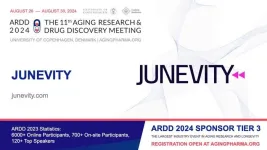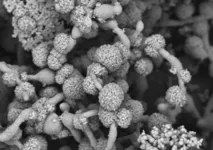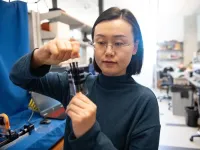(Press-News.org) WASHINGTON (May 3, 2024) – Children with life-limiting rare diseases and their caregivers face tremendous stress and anxiety about the heart-breaking decisions before them. A new intervention – designed at Children’s National Hospital to support the palliative needs of these families – improved their spiritual and emotional well-being, according to new research published in the journal, Pediatrics.
Called FACE Rare (FAmily CEntered Pediatric Advance Care Planning Intervention for Rare Diseases), the counseling tools were found to be safe, effective and increased feelings of peace among families in this underserved population.
“Seventy-four percent of the families in that intervention group reported feelings of sadness, yet 100% reported our pilot intervention was a worthwhile experience,” said Maureen Lyon, Ph.D., a clinical psychologist and principal investigator at the Center for Translational Research at Children’s National. “If you're talking about the possibility that the worst thing in the world would happen to you – that your child might die, and what you would want for them – the families found that our intervention helped. They had a place to process their feelings and consider what would be important to their child.”
A rare disease is defined as any condition affecting fewer than 200,000 people in the United States. In pediatrics, these diseases often require constant caregiving and require families to face the cruel reality that the diagnosis may be life-limiting. In such cases, clinical teams often decide that conversations about advanced care planning (ACP) are needed.
The pilot-phase, randomized trial enrolled patients from Children’s National between 2021 and 2023. Research nurses underwent two days of training to be certified in the new intervention. Families assigned to the new approach received three, weekly 60-minute sessions and were evaluated using evidence-based assessment tools, including the Carer Support Needs Assessment Tool/Action Plan and the Next Steps: Respecting Choices Pediatric ACP Conversation. Measures of anxiety and spiritualization were tracked, and families returned after three months for follow-up.
Patients had a range of diagnoses that put tremendous strain on the caregivers, including complex digestive disorders, white-matter diseases and rare forms of epilepsy. Yet the caregivers expressed similar challenges: having time for themselves during the day, knowing what to expect in the future for their child’s care, and managing financial, legal and work issues.
Reinforcing the need to improve engagement and support for these families, the investigative team found that those who received the FACE Rare intervention reported higher levels of spiritual meaning and peace than those who received “treatment as usual.” All families living below the poverty line reported greater anxiety, and noteworthy to the team, black caregivers were less likely to report caregiver distress than non-black caregivers.
Dr. Lyon said future research needs to understand better how families respond to the challenges of rare diseases and unique social determinants of health that can change the approach to care.
“In some cultures, and families, having strong feelings is discouraged,” Dr. Lyon said. “We want to give families and caregivers space to have these emotions and think about what would be important for their child, if the worst were to happen. They appreciated that they participated in the program and had the space to consider these difficult questions.”
Read the full study, “Advance Care Planning for Children with Rare Diseases: A Pilot RCT,” in Pediatrics.
Media contact: Katie Shrader | kshrader@childrensnational.org
###
About Children’s National Hospital
Children’s National Hospital, based in Washington, D.C., was established in 1870 to help every child grow up stronger. Today, it is the No. 5 children’s hospital in the nation and ranked in all specialties evaluated by U.S. News & World Report. Children’s National is transforming pediatric medicine for all children. The Children’s National Research & Innovation Campus opened in 2021, a first-of-its-kind pediatric hub dedicated to developing new and better ways to care for kids. Children’s National has been designated three times in a row as a Magnet® hospital, demonstrating the highest standards of nursing and patient care delivery. This pediatric academic health system offers expert care through a convenient, community-based primary care network and specialty care locations in the D.C. metropolitan area, including Maryland and Virginia. Children’s National is home to the Children’s National Research Institute and Sheikh Zayed Institute for Pediatric Surgical Innovation. It is recognized for its expertise and innovation in pediatric care and as a strong voice for children through advocacy at the local, regional and national levels. As a non-profit, Children's National relies on generous donors to help ensure that every child receives the care they need.
For more information, follow us on Facebook, Instagram, Twitter and LinkedIn.
END
Pilot program improves well-being of families during advanced care planning
Underserved rare disease population needs more evidence-based emotional support, research
2024-05-03
ELSE PRESS RELEASES FROM THIS DATE:
The key role of Galectin-3 in brain tumour development
2024-05-03
A research group at the Department of Biochemistry and Molecular Biology of the University of Seville has made a significant advance by discovering the crucial role of the protein Galectin-3 in the progression of various types of brain tumours. In these tumours, the most abundant immune system cells, microglia and macrophages, overexpress Galectin-3, which creates an immunosuppressed environment which inhibits the action of other immune cells against cancer cells.
In vitro findings have shown that specific inhibition of Galectin-3 in microglial cells promotes expression of proinflammatory markers and reverses the presence of key immunosuppressive ...
Announcing Junevity as Tier 3 Sponsor of ARDD 2024
2024-05-03
The University of Copenhagen is excited to announce Junevity as a Tier 3 Sponsor of the 11th Aging Research & Drug Discovery Meeting, the world's largest conference on aging research in the biopharmaceutical industry that will transpire on August 26 - August 30, 2024 on-site at the Ceremonial Hall, University of Copenhagen, and online.
Junevity is rewinding diseases of aging with novel transcription factor medicines. Based on 6 years of breakthrough research at UCSF, Junevity's REWINDTM platform identifies new targets based on large-scale genomics, machine learning, and cell aging experiments. Junevity is advancing multiple therapeutic programs towards ...
Climate change amplifies severity of combined wind-rain extremes over the UK and Ireland
2024-05-03
Climate change will cause an increase in extreme winter storms combining strong winds and heavy rainfall over the UK and Ireland, new research has shown.
The new study was led by experts at Newcastle University and the Met Office and investigated how future climate change may influence compound wind-rain extremes, which are events where extreme wind and rainfall occur simultaneously.
The researchers analysed data from climate simulations covering control (1981-2000) and future (2060-2081) periods, ...
Exeter announces new £3.4 million global funding for solutions to antifungal drug resistance
2024-05-03
Researchers working on solutions for antifungal resistance are being encouraged to apply to a new £3.4 million fund led by the University of Exeter with UK government funding.
The new fund, called FAILSAFE (Fungal AMR Innovations for LMICS: Solutions and Access For Everyone), is being launched by the University of Exeter’s MRC Centre for Medical Mycology, in partnership with the UK Department of Health and Social Care’s Global AMR Innovation Fund (GAMRIF).
Life-threatening fungal diseases take as many lives annually as TB or malaria, but the organisms ...
In medieval England, leprosy spread between red squirrels and people, genome evidence shows
2024-05-03
Evidence from archaeological sites in the medieval English city of Winchester shows that English red squirrels once served as an important host for Mycobacterium leprae strains that caused leprosy in people, researchers report May 3 in the journal Current Biology.
“With our genetic analysis we were able to identify red squirrels as the first ancient animal host of leprosy,” says senior author Verena Schuenemann of the University of Basel in Switzerland. “The medieval red squirrel strain we recovered is more closely related to medieval human strains from the same city than to strains isolated from infected ...
Source of pregnancy complications from infections revealed by placenta map
2024-05-03
The first panoramic view of infection pathways in the human placenta has been created, which could highlight potential drug targets to develop pregnancy-safe therapies for malaria, toxoplasmosis and listeria, all diseases that can cause severe pregnancy complications.
Researchers from the Wellcome Sanger Institute, the University of Cambridge, the University of Dundee, and collaborators, used novel ‘mini placenta’ models to map the placental response to infections in early development. This ...
Lepra in the middle ages: New insights on transmission pathways through squirrels
2024-05-03
Researchers at the University of Basel and the University of Zurich have been able to prove that British squirrels carried leprosy bacteria as early as the Middle Ages. Further results revealed a link between the pathogens found in the medieval rodents and those in the local human population during that period.
Skin spots, deformed noses, ulcers: leprosy, is an infectious disease that can bring about some serious symptoms. The bacterium responsible, Mycobacterium leprae, which still infects around 200,000 people each year especially in the Global South, also has a long history in Europe. The international research group led by paleogeneticist Professor Verena Schünemann ...
The Foundational Questions Institute, FQxI, appoints Pinar Emirdag to Board of Directors
2024-05-03
The Foundational Questions Institute, FQxI, a philanthropically-funded science funding agency and think tank, is delighted to announce that Dr Pinar Emirdag has been appointed to the Institute’s Board of Directors.
Emirdag, a financial services executive and entrepreneur, is currently director of Hupomone Ventures, having previously spearheaded industry-changing initiatives at institutions such as JP Morgan, Citi and the London Stock Exchange and at start-ups including Lava Trading and Clearmatics. FQxI’s Chief Operating Officer Kavita ...
Stretchable e-skin could give robots human-level touch sensitivity
2024-05-03
A first-ever stretchy electronic skin could equip robots and other devices with the same softness and touch sensitivity as human skin, opening up new possibilities to perform tasks that require a great deal of precision and control of force.
The new stretchable e-skin, developed by researchers at The University of Texas at Austin, solves a major bottleneck in the emerging technology. Existing e-skin technology loses sensing accuracy as the material stretches, but that is not the case with this new version.
"Much like human skin has to stretch and bend ...
Researchers collaborate with the shipping industry to cut costs, fuel consumption and greenhouse gas emissions in shipping
2024-05-03
A common challenge in shipping occurs when ships arrive promptly at their destination, only to find a crowded harbour. Subsequently, they are often required to wait outside the harbour or anchor until port services and a quayside become available.
According to a report from the International Maritime Organization (IMO), it is not uncommon for ships to spend between 5-10% of their time waiting to enter port. Excessive speeds followed by extended waiting times with engines running result in a notable increase in fuel consumption. This is a problem that impacts both the climate and the economy.
Several European universities, ports, shipping companies and technology firms have now joined forces ...
LAST 30 PRESS RELEASES:
Call me invasive: New evidence confirms the status of the giant Asian mantis in Europe
Scientists discover a key mechanism regulating how oxytocin is released in the mouse brain
Public and patient involvement in research is a balancing act of power
Scientists discover “bacterial constipation,” a new disease caused by gut-drying bacteria
DGIST identifies “magic blueprint” for converting carbon dioxide into resources through atom-level catalyst design
COVID-19 vaccination during pregnancy may help prevent preeclampsia
Menopausal hormone therapy not linked to increased risk of death
Chronic shortage of family doctors in England, reveals BMJ analysis
Booster jabs reduce the risks of COVID-19 deaths, study finds
Screening increases survival rate for stage IV breast cancer by 60%
ACC announces inaugural fellow for the Thad and Gerry Waites Rural Cardiovascular Research Fellowship
University of Oklahoma researchers develop durable hybrid materials for faster radiation detection
Medicaid disenrollment spikes at age 19, study finds
Turning agricultural waste into advanced materials: Review highlights how torrefaction could power a sustainable carbon future
New study warns emerging pollutants in livestock and aquaculture waste may threaten ecosystems and public health
Integrated rice–aquatic farming systems may hold the key to smarter nitrogen use and lower agricultural emissions
Hope for global banana farming in genetic discovery
Mirror image pheromones help beetles swipe right
Prenatal lead exposure related to worse cognitive function in adults
Research alert: Understanding substance use across the full spectrum of sexual identity
Pekingese, Shih Tzu and Staffordshire Bull Terrier among twelve dog breeds at risk of serious breathing condition
Selected dog breeds with most breathing trouble identified in new study
Interplay of class and gender may influence social judgments differently between cultures
Pollen counts can be predicted by machine learning models using meteorological data with more than 80% accuracy even a week ahead, for both grass and birch tree pollen, which could be key in effective
Rewriting our understanding of early hominin dispersal to Eurasia
Rising simultaneous wildfire risk compromises international firefighting efforts
Honey bee "dance floors" can be accurately located with a new method, mapping where in the hive forager bees perform waggle dances to signal the location of pollen and nectar for their nestmates
Exercise and nutritional drinks can reduce the need for care in dementia
Michelson Medical Research Foundation awards $750,000 to rising immunology leaders
SfN announces Early Career Policy Ambassadors Class of 2026
[Press-News.org] Pilot program improves well-being of families during advanced care planningUnderserved rare disease population needs more evidence-based emotional support, research




